Dr. Bronner’s “All-One Activist” series profiles influential activists who are advancing the core causes that Dr. Bronner’s supports through its philanthropy and advocacy work including animal advocacy, regenerative agriculture, drug policy reform, and community betterment.
As a Dr. Bronner’s employee, I learned that the company is a philanthropic supporter of Compassion Over Killing (COK), a non-profit farm animal protection organization. As a lifelong vegetarian and animal lover, I was curious to learn more about the work they do. I recently had the honor of interviewing Erica Meier, Executive Director of Compassion Over Killing and a tenacious leader in the animal rights movement. *Editor’s note: Since this article was published, Compassion Over Killing has changed their name to Animal Outlook. We added this note and updated the article title in July 2020.
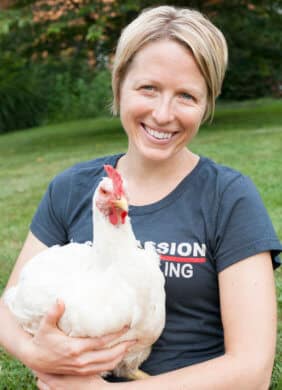
So, tell me, what is Compassion Over Killing? How did it get started?
COK started out as an all volunteer high school club in 1995 and we’ve come a long way in those 23 years! We are now a national force for animals, with staff all over the country working day in and day out to expose the cruelties forced upon farm animals. We also promote vegan eating as a way to build a kinder world for all.
That is our mission—to build a kinder world for all—and it’s driven forward by four core values:
- Justice: Our proactive legal advocacy challenges the status quo of animal agribusiness and aims to dismantle the systemic cruelties and exploitation upon which factory farming is built. Most people are surprised to learn that farm animals are routinely treated in ways that would result in criminal prosecution if those same abuses were inflicted on the dogs and cats with whom we share our homes.
- Truth: Our brave investigators go behind the closed doors of Big Ag to shine a bright light on the hidden horrors forced upon billions of farm animals, who are treated as little more than meat-, milk-, or egg-producing machines.
- Innovation: To make vegan eating as easy and accessible as possible, we reach out to national companies highlighting the growing demand for plant-based foods. With the help of consumers, we’ve successfully persuaded BOCA to go 100% egg-free, Lightlife is now 100% vegan, and chains such as Dunkin Donuts, Starbucks, and Subway have been rolling out vegan options. So our work is paying off!
- Compassion: We connect with individuals and communities to open a dialogue about the far-reaching impact our food choices have on animals, our health, and the planet. By providing information (leaflets, videos, etc) as well as tools for change (recipes, meal ideas, and lots of free food), we’re introducing people to the joys of plant-based eating. Our DC VegFest in the nation’s capital is one of the highlights of our compassion in action.
Can you tell us more about the investigative work that you do?
COK is perhaps best known for our investigative work, giving consumers what could be their first and only glimpse of the dark, hidden world where their milk, eggs, and meat come from. Investigations are the strongest pillar in the advocacy movement, revealing what the industry doesn’t want the public to see.
In grocery stores, consumers are surrounded by marketing and packaging that depicts idyllic images: cows roaming in green pastures, or chickens happily sitting on a nest of eggs. Sadly, little could be further from the truth: each year, billions of birds, pigs, and cows are intensively confined inside cages or crammed into dark filthy sheds, just so we can cheaply eat their meat, milk, and eggs. Most of these smart and social animals will never even set foot on grass, and the first time they’ll feel the warmth of the sun or breathe fresh air will likely be their last day of life—on a truck bound for the slaughterhouse.
Many of these factory farms and slaughterhouses are tucked away in rural areas, unseen by the public yet wreaking havoc in their communities. They take a toll on the environment, exploiting everything and everyone in their path.
Our investigators get jobs at the facilities and wear hidden cameras to document the day-to-day miseries, exposing cruel yet routine practices on factory farms. With few state laws and no federal laws whatsoever that protect farm animals while they are on the farm, factory farmers can essentially mistreat and abuse these animals any way they see fit.
That’s why COK has made it our mission to pull back the curtains and shine a light on these hidden horrors. Consumers deserve to know the truth.
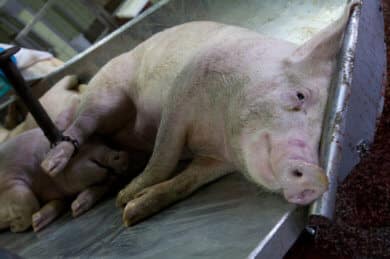
Is there anything you’re focusing on to address the lack of federal regulations?
Right now, COK is opposing the USDA’s proposal to deregulate pig slaughterhouse inspections. In a nutshell, it’s a program that would allow pig slaughterhouses to operate with fewer government-trained inspectors and place many of those food safety inspection powers into the hands of slaughterhouse employees. At the same time, it would allow slaughterhouses to speed up the kill line. These lines already run at dangerously fast speeds that often result in animal abuse and worker injuries. This USDA proposal will put animals, workers, and consumers at risk.
How do you as an organization, balance improving animal welfare at factory farms for meat consumption and promoting a plant-based diet?
Without a doubt, the most impactful step we can take to protect animals, the planet, and our own health is to simply leave animals off our plates. Every time we choose a plant-based meal, we’re making a difference. And we don’t have to give up the flavors we love—we can instead enjoy the cruelty-free version of our favorite foods.
We also recognize that problems posed by factory farms are deeply systemic, and they aren’t going to go away overnight. There’s a huge gap between how people believe farm animals should be treated and what these animals’ lives are actually like. By exposing these painful realities, we can help take steps to ban some of the most egregious practices while also empowering compassionate consumers to make choices that better align with their values.
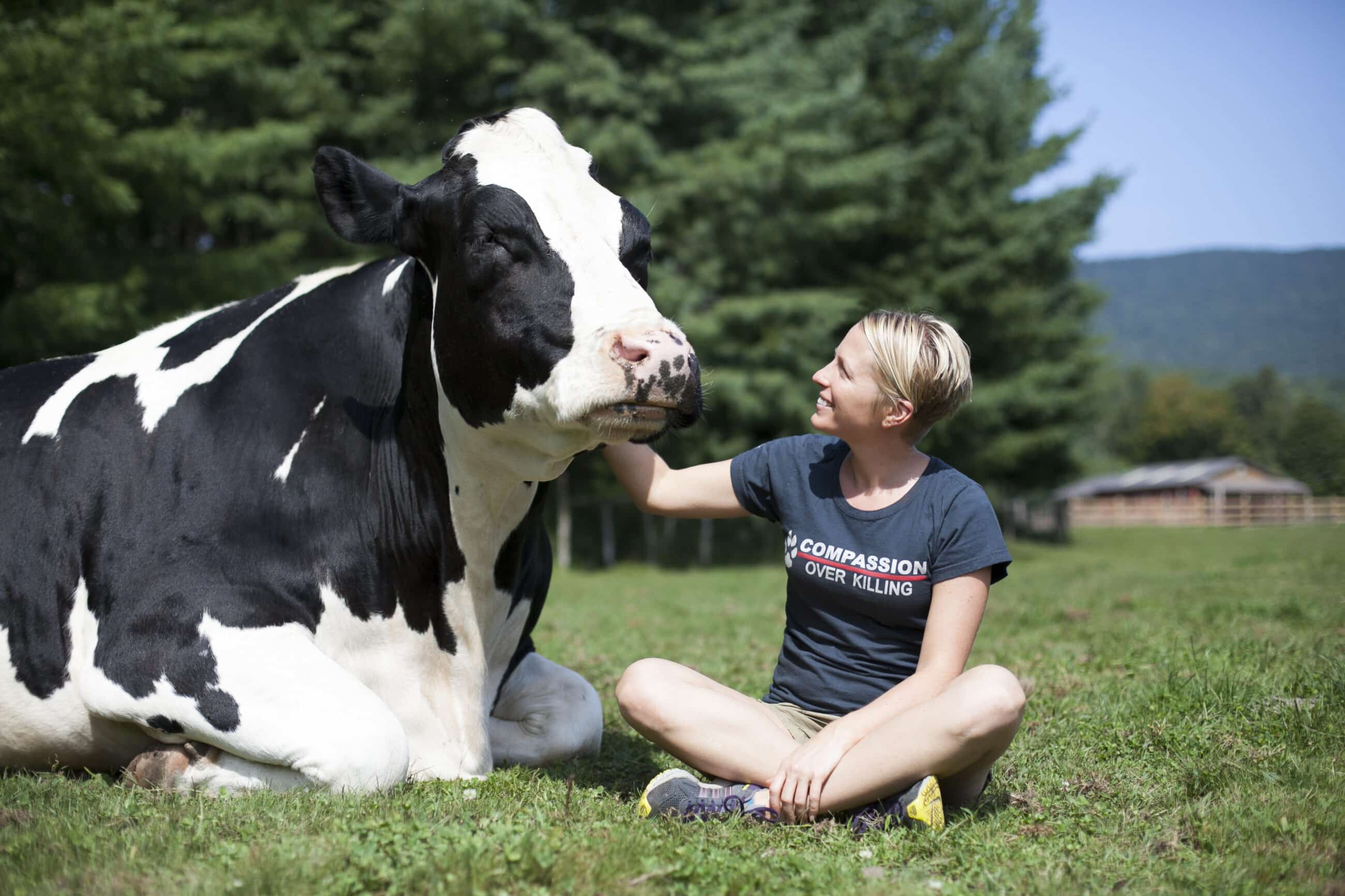
How did you become an advocate for animals? Why do you do this work and what inspires you?
Like most kids, I always felt a strong connection to animals. At a young age, while eating dinner, I suddenly became aware that the meat on my plate was from an animal. But I felt alone in this discomfort and didn’t know what I could do. My dad’s family owned a small meat-packing company, so we ate a lot of meat growing up—it was part of our family. As a freshman in high school, I thought more about my discomfort eating animals but also started reading more about how a meat-based diet is harmful for the planet—and that’s when I discovered the idea that I could become a vegetarian! A few years later, I learned more about what really happens on factory farms, specifically to dairy cows and egg-laying hens, and I immediately became vegan. That’s also when I switched my career path from environmental protection to animal protection. That was 25 years ago and I haven’t looked back.
I interned with PETA while in college and worked there for about 3 years after graduating. Becoming more interested in humane law enforcement, I moved to DC to work as an animal control officer for the Washington Humane Society. While that job was incredibly challenging from a physical and emotional standpoint, it was also deeply rewarding and educational. When a position opened up at COK, I decided to take a leap into farm animal advocacy, where I have been ever since.
This work has been my passion. I envision myself advocating for compassion for the rest of my life. I’m really drawn towards making the world a better place.
Compassion Over Killing is one of the few national farmed animal advocacy organizations in the US led by women. Why is this significant and how does this position you as an effective advocate?
The animal protection movement as a whole is overwhelmingly fueled by women, we represent upwards of around 75%. And specifically in the farm animal advocacy section of our movement, leadership and key decision-making positions are largely in the hands of men. This doesn’t reflect the diversity of our movement or our society in general.
If women comprise 75% of the animal protection movement, then our leadership should reflect that. We’d like to see more women elevated into key positions, and our voices amplified to reflect our contributions.
As a movement, we are not immune to many of the same injustices we’re struggling with societally. We need to address gender inequities, sexual harassment, toxic workplace culture, and any other forms of discrimination that exist.
COK comes to the table willing to stand up for our values of truth, justice, compassion and innovation. We’re comfortable with initiating or engaging in uncomfortable conversations if it helps to challenge our movement to grow. We also recognize the vital importance of listening and learning from others. If we don’t open up the dialogue to include more voices and perspectives, our movement will stagnate. We believe the moral integrity of our movement is reflected not just in how we treat animals but also in how we treat each other.
How do animal exploitation and other forms of social injustice intersect?
Animal agribusiness as a whole is a profit-driven system that relies on exploitation. It exploits female animals, like dairy cows and egg-laying hens, for their reproductive capabilities. It exploits a low-paid labor force and takes advantage of undocumented workers. They are put in dangerous roles and sustain injuries, then discouraged from reporting these injuries. It’s exploiting and destroying rural communities, including the land—raising animals for food is a leading cause of environmental destruction and resource depletion.
If we want to create a better world for all animals, including people, we need to fight for justice on all fronts. It’s important for our movement to examine our shared values and interests to effectively connect and build bridges with other social justice movements. This needs to be intentional and thoughtful—and it’s a learning process.
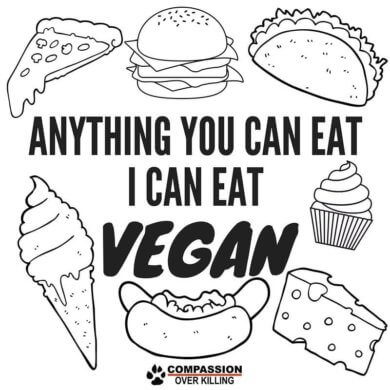
What have vegetarians, vegans, and other anti-factory farming advocates achieved in the last three to four decades?
Most noticeable is definitely the food—taste, variety, and accessibility! Vegan eating has shifted from the margins to the mainstream thanks to consumer interest driving the widespread availability of innovative vegan foods. As someone who has been vegan for 25 years, I’ve seen this shift, and can also attest to how far the flavors have come—from “meaty” veggie burgers to decadent dairy-free ice cream to vegan cheese that melts on pizza!
Finding vegan food is getting easier and easier. Dunkin’ Donuts now has almond milk, White Castle offers several veggie burger options, Ben & Jerry’s is dishing out dairy-free flavors, and even several kinds of Girl Scout cookies are vegan! Grocery stores nationwide are stocking up on vegan products to meet the growing consumer demand. You can find animal-free options wherever you go. Vegan food is becoming convenient. Animal-free food is becoming the new norm.
What advancements have we seen in popular culture in favor of animal rights?
The idea that vegan eating and animal rights are part of pop culture is in and of itself incredibly significant! Many celebrities are using their platforms to tout the power of plants—Beyoncé, Natalie Portman, Joaquin Phoenix, Kristen Bell, Miley Cyrus, Stevie Wonder and countless others.
Even professional athletes are getting in the game, proving that vegan diets can enhance athletic performance: Formula One’s Lewis Hamilton, tennis pro Venus Williams, Olympians Dotsie Bausch and Seba Johnson, and boxing legend David Haye to name a few.
And here in DC, vegan eating is even gaining steam on the political map, thanks to Sen. Cory Booker as well as Rep. Jamie Raskin!
Can you tell us about Compassion Over Killing’s partnership with Dr. Bronner’s?
We love working with Dr. Bronner’s because, on a corporate level, they are one of the few companies that put their values front and center. It is so refreshing to find a company that sincerely wants to help build a better world, and is actively working to make this happen. Partnering with Dr. Bronner’s has been encouraging, enlightening, and empowering for us.
Our values align and connect with Dr. Bronner’s, and the company’s incredibly generous financial support has allowed us to expand our staff, conduct more undercover investigations, and launch new initiatives to empower people to choose vegan foods.
Dr. Bronner’s support also allows us to expand our successful annual VegWeek campaign which encourages people to explore benefits of vegan eating by taking a 7-Day VegPledge.
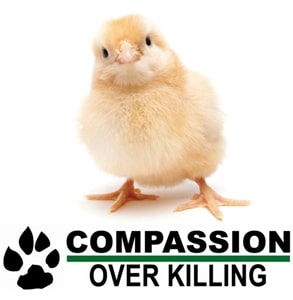
How can readers support your work and the fight for a more compassionate world?
We are always looking for volunteers to help at various events or with different campaigns, which can be in your community or sometimes it might involve getting active by sending out some emails, signing and sharing a petition, etc. We also have an active internship program in Washington D.C, and legal externships in Los Angeles or remotely.
And of course, as a nonprofit organization, all the work we do is only made possible through the generosity of our supporters—readers can become a member making a tax-deductible donation to our organization. Every gift helps us help animals.
At last but not least, what is your favorite Dr. Bronner scent?
Oh, I love so many scents—but if I have to choose one, it’s almond, hands down!